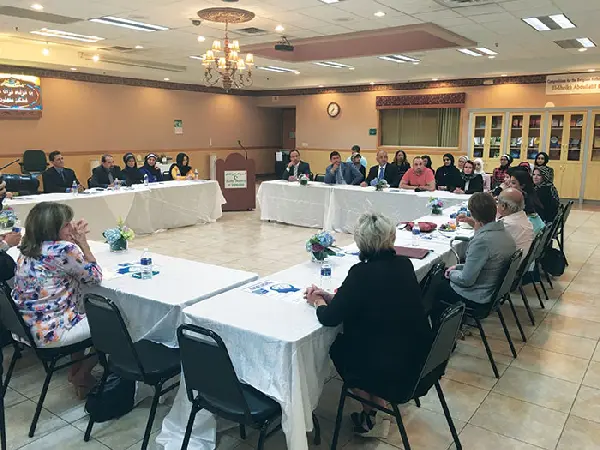
|
| Community leaders gathered at the Islamic Institute of Knowledge to discuss mental health and substance abuse. |
DEARBORN — Mental health and substance abuse have long been topics kept in the dark in the Arab American community. But now, a local mosque is getting ready to tackle the subject head on.
On Monday, July 11, C-Assist, a newly formed program led by local Muslim women under the umbrella of the Islamic Institute of Knowledge, held a forum with local leaders, doctors, teachers and religious leaders at the mosque to discuss avenues to bring the stigma of mental health and substance abuse to the forefront.
Nancy Berry, the founder of C-ASIST, told The AANews that the group had decided to tackle the subject following a string of deaths in the local community related to mental health and substance abuse.
“The incident rates of suicides, mental health and substance abuse in this community has been heavy,” Berry said. “It needed immediate attention. Everyone knows the number of deaths of young adults requires attention from the stakeholders and leaders of this community. It’s not an issue that can be ignored anymore.”
Many leaders turned out for the panel discussion, to give advice to board members of C-ASIST on how to educate and inform parents, children and families about the stigmas.
Those in attendance included Dearborn City Council President Susan Dabaja, Dearborn Heights Councilman Dave Abdallah, 20th District Court Judge David Turfe and 41st District Judge Linda Davis.
Dabaja, a practicing attorney, told the board that she discovered a pattern among local parents whenever she represented clients with drug offenses.
“I think the strongest thing you have to overcome is the stigma parents have of admitting their children have problems,” Dabaja said. “The parents don’t want to admit to any wrongdoing. I understand they are trying to protect them…but they don’t understand that they are enabling it. I’ve had clients come back for repeat offenses because the parents tried to cover it up. We have to make them understand that by doing this, they are creating a bigger problem for their children.”
Judge Turfe told the board that local institutions should be open to hosting prevention programs as well as programs that guide addicts back on the right path. He added that the district courts are limited in their resources.
“I have always thought that Islamic institutions are a safe haven, where you can come and feel comfortable about discussing your issues,” Turfe said. “A lot of times when they come to the court, it’s already too late. They are already on drugs. We can only do so much. The key is, try to get to them before it gets to that level.”
Latifeh Sabbagh, a social worker in the Dearborn Public Schools, was also a part of the panel discussion. Having worked in the district with students at the elementary, middle school and high school level, Sabbagh noted that cultural differences tend to get in the way of parents grasping that their child might have a problem.
“Parents play a huge role,” Sabbagh said. “They do so because perception is a huge factor. As parents, they have goals and expectations. They don’t deal with the everyday pressure that their child does. Instead of changing the child’s culture to be fitting to them, it’s important the parents change their culture to fit their children, because each child is
different.”
Sabbagh noted that often a child battling a mental illness or substance issue may get overlooked by a parent because they are facing financial struggles or overcoming medical issues themselves.
However, she has found an avenue that has been met with a positive reception. When Sabbagh identifies a student with an issue, she will personally visit their home if she feels a parent is hesitant over the phone.
“It’s very intimidating to tell a parent to come in and meet with the whole team,” Sabbagh said. “So I like to prepare them and practice with it. I feel parents are more receptive this way. When you go to their home, you learn about the child and you get to see the atmosphere they are in. Every child has a different story. So you get to learn a lot and the dynamics change once you get the opportunity to understand what’s happening.”
Sabbagh said she was delighted that the local mosques are finally bringing taboo discussions to the forefront.
“I’m happy that a place people find to be a safe haven can also be a place of resources,” she said. “It’s a positive movement, even though we might be behind. We are still taking the initiative and that’s what matters.”
For the Islamic Institute of Knowledge, the discussion on mental health and substance abuse was just a kick-off to a larger initiative that will begin rolling out in the coming months. On August 6, the mosque will be holding a open door conference for the community to discuss mental health and substance abuse stigmas. The following day, the mosque will also organize a walk and picnic.
“Everyone is on board with the initiative we are launching,” Berry said. “There is a stigma in this community and we want to raise awareness. There’s a cultural taboo and this is the time to eliminate it.”






Leave a Reply